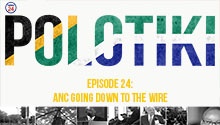A new survey shows that the deep-seated rot associated with state capture does not sit well with the majority of South Africans, with 77% of the population feeling that the country is moving “in the wrong direction”.
And they want corrupt leaders and politicians booted out.
The qualitative and quantitative research took four months to compile and was conducted by Ask Afrika and Infusion Knowledge Hub. They were commissioned by the Centre for Communication and Reputation Management at the University of Pretoria (UP) to explore the views of ordinary citizens about corruption and state capture.
More than 2 000 citizens aged 18 and older were questioned.
The research entailed understanding how citizens defined themselves within the broader context of the population, and finding out their views on what the most pressing issues within government were, as well as the extent to which they perceived corruption and state capture to be prevalent in the country.
It aimed to assess people’s satisfaction with political performance and South African voting patterns and tendencies, and to gain a scientifically verified understanding of how most South Africans believe corruption and state capture will affect the country’s future.
The results highlight high levels of distrust and dissatisfaction with government’s performance, finding that most citizens believed that their basic needs were not being met as a result of corruption and state capture.
Active citizenship against corrupt individuals was strongly emphasised in the results, as 62% of those polled expected jail sentences and criminal charges to be meted out against corrupt individuals – followed by 41% who were planning to vote corrupt politicians out of power.
Despite the problems, 84% of respondents remained proudly South African, with 46% of them choosing to be identified first as South Africans before any other demographic descriptors such as race, gender, religion or culture.
Focus groups for the research were held in KwaZulu-Natal, Gauteng and the Western Cape. Discussions and themes presented to those surveyed centred on the current mood of the nation and voting patterns, satisfaction with government, corruption, state capture and hopes for the future.
The fight against corruption was reflected as the top priority for citizens and they expected government to listen to their needs and wants.
The overwhelming sentiment was that corruption “degraded the fibre of society”, the research found.
Most citizens had heard of corruption and a third of them believed that state capture was a reality in South Africa. They fingered the main actors in corruption and state capture as high-level politicians and businesspeople, regarding them as having a direct negative effect on their lives.
They agreed that corruption and state capture instilled a personal sense of loss and psychological disempowerment, and reduced their trust in government.
UP professor Ronel Rensburg said: “This project aims to make research accessible to the general population and to encourage all individuals or groups with a willingness to further investigate these concepts and practices to use the research findings.
“This will be a step closer to the democratisation of research in South Africa. The data and results aim to give voice to ordinary citizens and to be used as a catalyst for positive change in South Africa.”

































